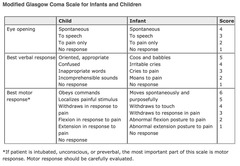Pediatric Neuro assessment – Flashcards
Unlock all answers in this set
Unlock answersquestion
Assessing child's mental status
answer
- Watch infant interact with mom or dad - Ask older child to follow directions or answer questions. - Assess speech in the older child
question
Assessing child's motor function and balance
answer
- Have child push and pull against the doctors hands with arms or legs - squeeze fingers, hop, skip, jump - Assess balance with one side - Passive and active motion
question
Assessing child's sensory perception
answer
Dull needles, tuning forks, alcohol swabs.....etc. and have child identify sensation upon touch.
question
Cranial nerve 1
answer
Olfactory (smell)
question
Cranial nerve 2
answer
Optic (vision)
question
Cranial nerve 3
answer
Oculomotor (pupil size and adjustment)
question
Cranial nerve 4 (goes with 2, 4, and 6)
answer
Trochlear (movement of eye, pupillary reaction, ability to follow an object)
question
Cranial nerve 5
answer
Trigeminal (chewing, rooting, sucking)
question
Cranial nerve 6
answer
Abducens (following object with they eyes)
question
Cranial nerve 7
answer
Facial nerve (taste, smiling)
question
Cranial nerve 8
answer
Acoustic (hearing)
question
Cranial nerve 9
answer
Glossopharyngeal (swallowing, taste)
question
Cranial nerve 10
answer
Vagus (swallow and gag)
question
Cranial nerve 11
answer
Accessory (movement of shoulders and neck
question
Cranial nerve 12
answer
Hypoglossal (stick tongue out)
question
What is your dirty pnemonic?
answer
Oh, Oh, Oh, To Touch And Feel A Girls' Vagina And Hymen.
question
Blinking reflex
answer
infant closes eyes to bright lights (permanent)
question
Babinski reflex
answer
toes fan out upon stroke up and out of foot (8-12 months)
question
Crawling reflex
answer
infant placed on abdomen will make crawling motions
question
Morrow reflex
answer
sudden change in position will cause infant to throw back head, thrust out the arms, and open the palms (6 months)
question
Palmar and plantar grasp reflex
answer
put something in the baby's hand and they will grasp it (3-4 months)
question
Reflex hammer
answer
test reflexes at knee or elbow of the older child
question
What to ask the parent
answer
- Is what you are seeing normal for the child? *you might see large changes, but mom and/or dad will notice the subtle changes for their child.
question
Early warning signs of altered neuro status in the child
answer
Change in level of consciousness and/or behavior Persistent headache Vomiting Irritability Acute seizures
question
Late warning signs of altered neuro status in the child
answer
- changes in vital signs - pupillary changes
question
Complaints that warrant a full neuro examination include
answer
Headaches Blurry vision Change in behavior Fatigue Change in balance or coordination Numbness or tingling in the arms or legs Decrease in movement of the arms or legs Injury to the head, neck, or back Temperature (fever of unknown origin = FUO) Seizures Slurred speech Weakness Tremor
question
Full consciousness
answer
awake and alert; oriented to time, place, and person; behavior appropriate for age
question
Confusion
answer
Impaired decision making
question
Disorientation
answer
Confusion regarding time, place; decreased LOC
question
Lethargy
answer
Limited spontaneous movement, sluggish speech, drowsy, falling asleep quickly
question
Obtundation
answer
arousable with stimulation
question
Stupor
answer
remaining in a deep sleep, slow response to vigorous and repeated stimulation or moaning responses to stimuli
question
Coma
answer
no motor or verbal response or extension posturing to noxious (painful) stimuli
question
Persistent vegetative state
answer
Permanently lost function of the cerebral cortex; eyes follow objects only by reflex or when attracted to the direction of loud sounds; all four limbs are spastic but can withdraw from painful stimuli; hands show reflexive grasping and groping; the face can grimace, some food may be swallowed, and the child can groan or cry but utter no words.
question
Things that contribute to altered level of consciousness Pnemonic = AEIOU TIPS
answer
Alcohol Epilepsy, encephalopathy, electrolyte abnormalities, endocrine disorders Insulin, intussusception Overdose, oxygen deficit Uremia Trauma Infection Poisoning, psychiatric conditions Shock, stroke, space-occupying lesion
question
Neurologic assessment scales
answer
They have been adapted for age- feature the pediatric glasgow coma scale + AVPU scale
question
What does AVPU scale stand for?
answer
alert, responds to verbal stimulation, responds to pain, unresponsive
question
Pediatric glasgow coma scale

answer
Based off verbal response, eye opening, and
question
What are some pertinent nursing diagnoses for the patient with an altered level of consciousness?
answer
1. high risk for injury 2. risk for altered growth and development
question
Nursing interventions for the child with altered level of consciousness
answer
1. seizure precautions 2. maintains a safe environment based on LOC and developmental level 3. Maximizes development /independence within limitations
question
Monitoring
answer
LOC - Glasgow Coma Scale for infants Developmentally appropriate orientation Motor response (able to follow directions) Abnormal postures Decorticate (adducted shoulders, flexed fingers, internally rotated legs, plantar flexion) Decerebrate (adducted shoulders, flexed fingers, extended arms, pronation or arms, plantar flexed) Pupillary reactivity Fontanel, N/V, HA, vision changes, poor feeding



